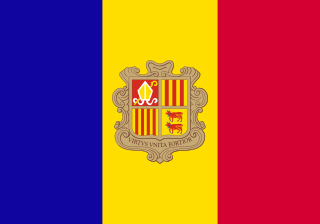
Andorra, officially the Principality of Andorra, also called the Principality of the Valleys of Andorra, is a sovereign landlocked microstate on the Iberian Peninsula, in the eastern Pyrenees, bordered by France to the north and Spain to the south. Believed to have been created by Charlemagne, Andorra was ruled by the count of Urgell until 988, when it was transferred to the Roman Catholic Diocese of Urgell. The present principality was formed by a charter in 1278. It is known as a principality as it is a diarchy headed by two princes: the Bishop of Urgell in Catalonia, Spain, and the President of the French Republic.
Andorra, officially the Principality of Andorra, also called the Principality of the Valleys of Andorra, is a sovereign landlocked microstate in Southwestern Europe, located in the eastern Pyrenees mountains and bordered by Spain and France.

La Seu d'Urgell is a town located in the Catalan Pyrenees in Spain. La Seu d'Urgell is also the capital of the comarca Alt Urgell, head of the judicial district of la Seu d'Urgell and the seat of Bishop of Urgell, one of the Andorra co-princes. It is in the district of Alt Pirineu i Aran, and is the town with the most inhabitants, having 17.4% of the district population. La Seu d'Urgell and Puigcerdà together have 30% of the population of the area.

The Diocese of Urgell is a Roman Catholic diocese in Catalonia (Spain) and Andorra in the historical County of Urgell, with origins in the fifth century AD or possibly earlier. It is based in the region of the historical Catalan County of Urgell, though it has different borders. The seat and Cathedral of the bishop are situated in la Seu d'Urgell town. The state of Andorra is a part of this diocese.
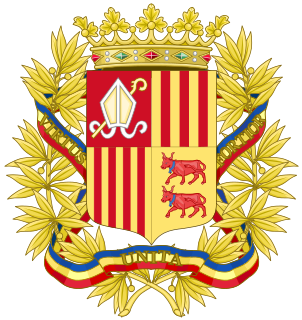
The co-princes of Andorra or the co-monarchs of Andorra are jointly the head of state of the Principality of Andorra, a landlocked microstate lying in the Pyrenees between France and Spain. Founded in 1278 by means of a treaty between the bishop of Urgell and the French Count of Foix, this unique diarchical arrangement has persisted through medieval times to the 21st century. Currently, the bishop of Urgell and the president of France serve as Andorra's princes, following the transfer of the count of Foix's claims to the Crown of France and, thence, to the president of France. Each prince appoints a personal representative, the French prince currently being represented by Patrick Strzoda and the Episcopal prince by Josep Maria Mauri.

Boris Mikhailovich Skossyreff was a White Russian adventurer who attempted to seize the monarchy of the Principality of Andorra during the early 1930s, styling himself Boris I of Andorra. He assumed the throne with support from the local citizens and government, before being deposed by neighboring Spanish authorities and eventually fading into obscurity.
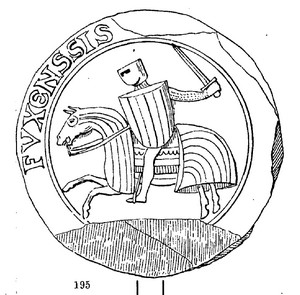
Roger Bernard II, called the Great, was the seventh count of Foix from 1223 until his death. He was the son and successor of the count Raymond-Roger and his wife Philippa of Montcada.
In Medieval France a paréage or pariage was a feudal treaty recognising joint sovereignty over a territory by two rulers, who were on an equal footing, pari passu; compare peer. On a familial scale, paréage could also refer to the equal division of lands and the titles they brought between sons of an inheritance.
According to the US Religious Freedom Report of 2006 there are about 2000 North Africans currently living in Andorra and they are the largest Muslim group in the country.

ErmengolVI, called el de Castilla, was the Count of Urgell from 1102 to his death. He was the son and successor of Ermengol V and María Pérez, daughter of Count Pedro Ansúrez, Lord of Valladolid, who became his tutor when he was orphaned in 1102.

Arnau Mir de Tost was a Catalan nobleman of Urgell, the lord of Llordà and viscount of Àger, a major figure in the eleventh-century Reconquista in Catalonia. Arnau is sometimes praised as the "El Cid of the Lands of Lleida" for his foundational role in reestablishing Christian rule in the region to the south of Urgell.

Andorra–La Seu d'Urgell Airport is a public airport owned by the Government of Catalonia and hosts general aviation and commercial flights. It is located in the municipality of Montferrer i Castellbò in Catalonia, eastern Spain, and serves the city of la Seu d'Urgell and the microstate Principality of Andorra, which is 12 km north of the airport. The airport has a short runway which limits aircraft sizes and the distance to destinations.
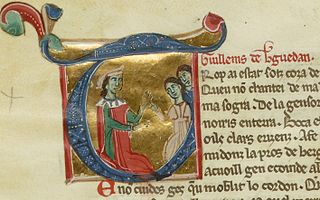
Guillem de Berguedà, or Guilhem de Berguedan in Occitan, was a Catalan troubadour and viscount of Berguedà. He was the most prolific Catalan poet of the twelfth century, though he composed in Occitan, and thirty-one of his poems survive. Most are sirventes, "typically violent and obscene, reflecting his character and turbulent life," but there are a few cansos. Most of what is known about him derives from his vida and his songs.
Sal·la was the Bishop of Urgell from 981 to 1010, and "one of the first Catalan figures whose own words" survive sufficiently "to give colour to his personality and actions", although all of the words attributed to him were written down by scribes. He receives mention in some sixty-three surviving contemporary documents. As bishop, Sal·la dated documents by the reign of Hugh the Great. Although his episcopate largely preceded the Peace of God movement in Catalonia, his excommunication of high-ranking public figures during a church–state dispute in 991 anticipated it. He also pioneered feudal practices such as the granting of fiefs and was frequently "ahead of the feudalising wave".
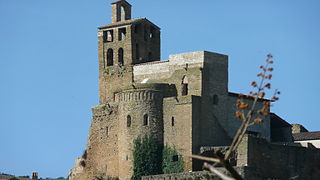
The Viscounty of Àger was a feudal jurisdiction that branched off the County of Urgell in 1094.
Andorra has established two registration schemes for same-sex couples: stable unions on 23 March 2005 and civil unions on 25 December 2014.

The Catalan language originated from Vulgar Latin in the Pyrenees Mountains between France and Spain. It diverged from the other Romance languages in the 9th century. At that time, Catalan spread quickly throughout the Iberian peninsula when the Catalan counts conquered Muslim territory. By the 11th century, the Catalan language was present in several feudal documents. Catalan was present throughout the Mediterranean by the 15th century. This was during a time when the city of Valencia was thriving.
Pere d'Urtx was Bishop of Urgell from 1269 to 1293. He became the first Episcopal Co-Prince of Andorra when he signed the paréage establishing joint-sovereignty over the territory with Roger-Bernard III, Count of Foix in 1278.
Arnau de Llordà was a Bishop of Urgell who served as Episcopal Co-Prince of Andorra from 1326 to 1341. He served alongside French Co-Prince Gaston II of Foix - Bearne.
.











